
A living masterpiece of nature and although all animals are amazing, this has to be one of the most awe-inspiring. Incredibly rare to see and found only in the rain forests of Mexico and Central America, this little creature is usually normal-looking and has rather drab colors, but if threatened by a potential predator, it undergoes an incredible transformation; it hangs from a branch with its hind legs, and inflates the front part of its body, until it looks just like a small pitviper ready to inject its deadly venom.
Not only does it mimic the triangular “head”, fierce eyes and shiny scales perfectly, but it also pretends to “strike” at enemies (it’s just a bluff, since it is not venomous or dangerous in any way). Surely, many of its potential enemies (including some humans!) fall for this incredibly accurate imitation and leave the caterpillar alone. As an adult, the Hemeroplanes is a rather non-descript moth that has absolutely nothing viper-ish about it. The Hemeroplanes caterpillar is poorly known, and sadly endangered due to deforestation.
2. Satanic leaf-tailed gecko
Uroplatus phantasticus
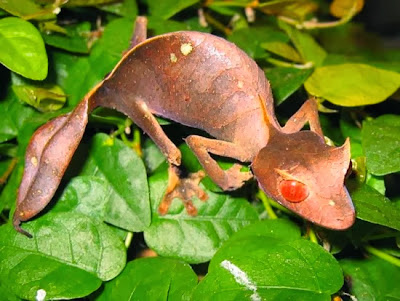
Evolution made this lizard looks so much like a decaying, dry leaf, that it is seldom seen, let alone eaten, by any predators. It is found only in Madagascar, where it shares the forests with other fantastic reptiles. It is an insect eater and despite its infernal name, scary eyes and defensive threat display (which it uses only when camouflage doesn’t work, which is very rarely), it is completely harmless to humans. Unfortunately, this incredible species is endangered due to over-collecting for the pet trade, and the devastation of its natural habitat (Madagascar’s forests have been reduced in a 90% and most of its iconic species are either gone or in the edge of extinction).
3. Leafy Sea Dragon
Phycodurus eques

This fish, closely related to the sea horse, survives by pretending to be a floating bunch of sea weed. It swims very slowly, which adds to the effect, and besides, its dorsal and pectoral fins (which do all the swimming), are transparent and practically invisible. I strongly suspect most predators don’t even know the leafy sea dragon exists at all! These amazing little creatures have weird reproductive habits; the female lays the eggs into the male’s body via a long tube, and the male carries the brood until the baby dragons hatch. This fish is found in the southern and western coasts of Australia.
4. Hairy crab
Kiwa hirsuta

Also known as the “Yeti crab”, this crustacean is covered on what, at first glance, appears to be fur, but is actually a dense covering of setae, like those found in the legs of some shrimps. These setae seem to function as a filter, detoxifying the water in which the creature lives. This is very useful when your habitat is a deadly hydrothermal vent that is constantly throwing poisonous minerals into the water. The Yeti crab is blind and colorless and lives its entire life in darkness, just like the olm, blobfish and hatchetfish. It seems that Nature sends many of its most surreal creations to the places where humans are most unlikely to see or reach them. Maybe because they will last longer that way?
5. Hatchetfish
Sternoptychidae
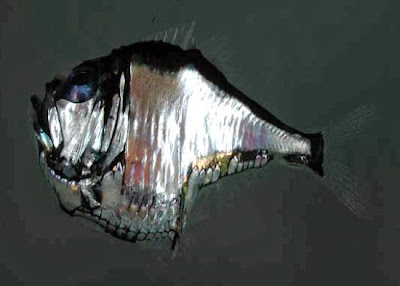
Viewed from the front, the hatchetfish looks otherworldly, and in a way, it does live in a different world from ours. This deep water fish is found in all the oceans except for the coldest regions, and, like the olm and blobfish, spends its entire life in almost complete darkness. The only life it sees is produced by living creatures, including itself, via special “photophores” or light-producing organs on its sides, which allow it to lure prey and to escape predators. As scary as it may look, the hatchetfish poses no threat for humans, being only a few centimeters long.
6. Assassin spider
Archaeidae
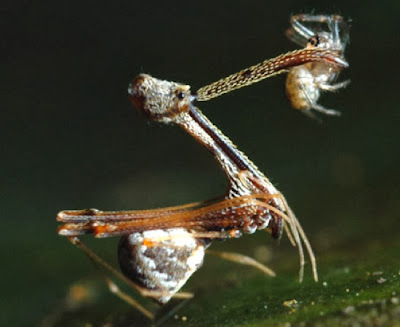
Don’t worry, SBF readers, The assassin spider is only 2 mm long and despite its name and creepy appearance, it is completely harmless to humans. Its long “neck” has evolved specifically to support the weight of its immense jaws, which are armed with venomous fangs and act as deadly traps for other, smaller spiders that are its main food.
7. Blobfish
Psychrolutes marcidus
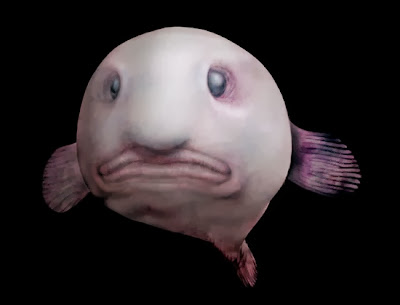
This gelatinous deep water fish has a face that only its mother would love (although those who truly admire Nature’s boundless and sometimes macabre creativity will certainly appreciate it too). Found in the oceans surrounding Australia and Tasmania, the blobfish leads a rather passive life, feeding on whatever piece of detritus floats within its reach. It lacks the muscular power of other fish and practically doesn’t spend any energy while swimming thanks to its body being less dense than water. Rarely seen alive, the blobfish is occasionally captured as by-catch by fisherman’s nets. I strongly doubt it’s edible, though.
8. Glass frog
Centrolenidae

What makes these little Tropical American frogs so surreal is that they have translucent skin, which basically makes them a living anatomy lesson without even having to cut open the frog! Indeed, some of their internal organs such as the heart, intestines and liver are perfectly visible when you look at the frog’s underside. They are closely related and behave similarly to the better known tree frogs.
9. Blanket octopus
Tremoctopus violaceus
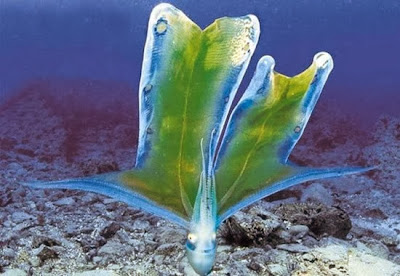
There’s no such thing as a “normal octopus”. These extraordinary animals look like they came from another planet, took a dip in our oceans and liked it enough to stay. Among the many strange traits of octopuses (octopi?) we could mention having three hearts, venomous saliva, a hidden parrot-like beak, being able to change the color and texture of their skin with incredible ease and speed (they are much better at it than say, chameleons) and having “intelligent arms” that don’t seem to need instructions from the brain to perform certain actions.
That said, there are some octopi that are more bizarre than others. The blanket octopus is one of them; for a start, the female is 40.000 times heavier than the male! The male is only 2.4 cms along and leads an almost planktonic lifestyle while the female is big, spectacular and over than 2 meters long. When it feels threatened, the female can also extend a cape-like membrane between its arms that makes her look bigger and badder than she really is. Finally, an interesting fact is that the blanket octopus is immune to the deadly Portuguese Man’O War “jellyfish”; as self defense, the clever octopus often tears off some Man’O War tentacles and uses them as a weapon.
10. Olm
Proteus anguinus
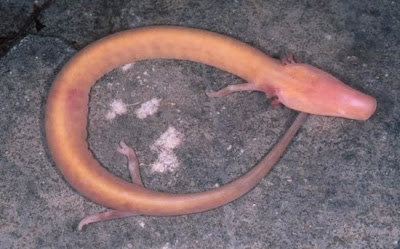
This amphibian, native to the deepest, darkest caves of Europe (most famously in Slovenia) and mistakenly identified in ancient times as a “baby dragon” has to be one of the most bizarre animals in the world. Completely blind, and lacking body pigmentation almost completely, the olm lives in a very alien sensory universe. Despite being blind, it can pick up both chemical and electrical signals via receptors on its entire body, which comes in handy to find the small invertebrates it feeds upon. Completely aquatic, the olm has a soft, pale skin that resembles somewhat that of a very pale human being, hence its local nickname of “human fish”. There’s a second subspecies of olm, the black olm, which is just as interesting but a tad less bizarre, since it has eyes and lacks the pale complexion of its cousin
No comments:
Post a Comment